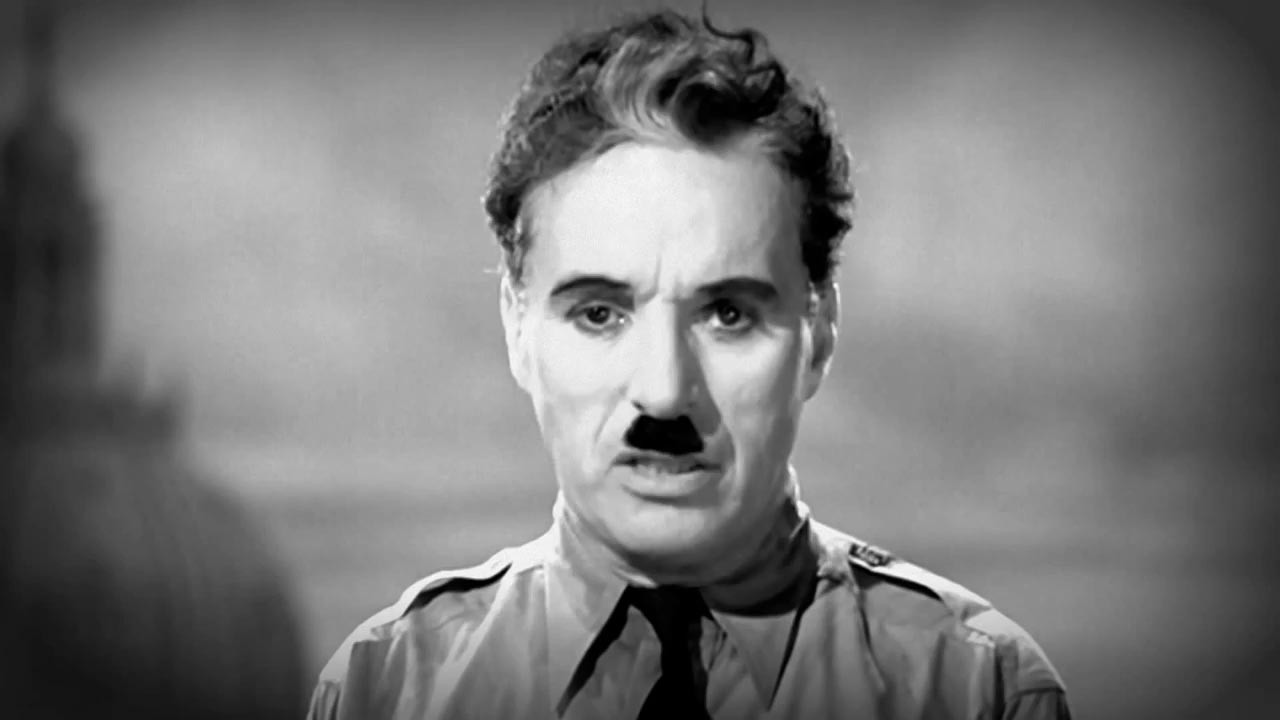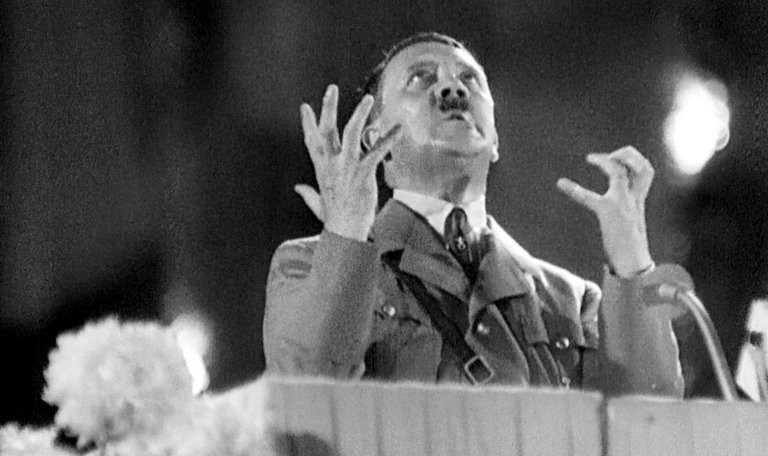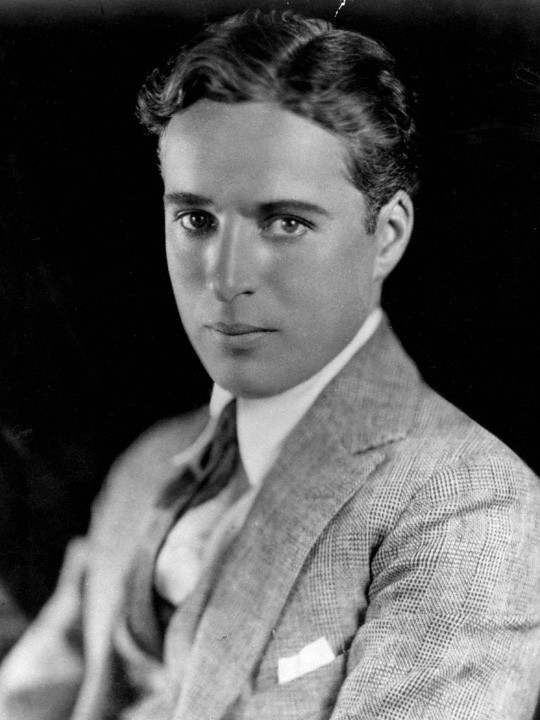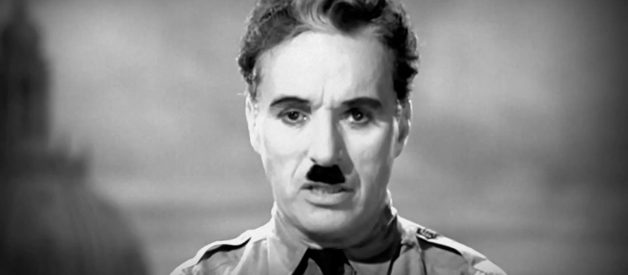What a silent film star chose to say when he had to speak
 Charlie Chaplin delivers his heartfelt speech in The Great Dictator (1940)
Charlie Chaplin delivers his heartfelt speech in The Great Dictator (1940)
Sometime in the 1930s Charlie Chaplin and the French filmmaker Ren Clair watched The Triumph of Will, Leni Reifanschal?s 1935 Nazi propaganda film that even contemporary critics begrudgingly admit is a masterpiece of cinema.
Clair was deeply upset by the Nazi movie. He believed it had the power to convert millions in the democratic west to fascism, such was its propagandistic brilliance. Chaplin, it is reported, found the film hilarious. The Triumph of Will, in Chaplin?s eyes, documented the absurdity of fascism?s hubristic rituals of goosestepping and hysterical speeches.
 Adolf Hitler in The Triumph of Will (1935)
Adolf Hitler in The Triumph of Will (1935)
Chaplin decided to make the antithesis of The Triumph of Will: a parody of Nazi politics that nevertheless dealt tenderly with the plight of its victims. By coincidence, filming began when the second world war broke out in September 1939.
Despite his disdain for fascism, the seriousness of what was at stake was not lost on him. For Chaplin, the film was very personal. Chaplin saw that fascism tricked the poor into believing nationalism and racism was the answer to their problems. He sympathised for the poor because he had suffered immense hardship himself.
Rags to Riches
Charles Spencer Chaplin is one of the most extraordinary rags-to-riches stories in modern history. The writer, actor, composer, director, and entrepreneur was born in London in 1889 to small-time music hall performers Hannah and Charles Sr.
His parents became estranged and Hannah fell into poverty when her singing career ended. Charlie attended a paupers? school as a young boy and at the age of seven was sent to Lambeth Workhouse, an institution for the destitute that offered accommodation in return for menial labour.
In 1898 his mother was committed to an asylum having battled with mental illness. Charles and his brother Sydney were sent to live with their father Charles Sr. who was practically a stranger to the boys and a severe alcoholic. Their time with him was traumatic for both the boys and elicited a visit from child protection officers.
Despite his impoverishment, Chaplin showed a precocious talent for acting from a very young age. With his mother?s encouragements and father?s contacts, Chaplin began to dance and act professionally as a teenager.
He joined a company that toured the US and was scouted by Keystone Studios to appear in films. As he appeared in a number of comedies, he soon developed his bowler-hatted ?Tramp? persona. Within a matter of a few years, Chaplin was the biggest star in the world.
In the twenties and thirties, Chaplin produced several masterpieces of filmmaking including The Kid, Gold Rush, City Lights and Modern Times.
 Charles Spencer ?Charlie? Chaplin (source: Wikipedia)
Charles Spencer ?Charlie? Chaplin (source: Wikipedia)
Chaplin wrote, directed and starred in his films. He even composed the music upon the invention of sound. Chaplin was a notorious perfectionist, his films were painstakingly planned and shot, often taking a long time to produce. He admitted to a ?neurotic state of wanting perfection.?
The comic also founded his own production and distribution companies ? the Charles Chaplin Film Corporation and (jointly) United Artists ? so that he could have full control over the production and distribution of his movies.
By the thirties Chaplin was concerned that he was becoming an anachronism in the new era of the ?talkies?. He had mastered the silent art form of pantomime and was both sceptical of sound films and worried his act would not translate.
The director travelled throughout Europe during a hiatus from film-making and became deeply concerned by the effects of the depression and the rise of fascism. When Chaplin visited Japan, he was the target of an assassination conspiracy by ultra right-wing nationalists who wanted to spark a war with the United States.
The Great Dictator
Chaplin and Adolf Hitler were born just four days apart, and Hitler, with his distinctive toothbrush moustache, resembled Chaplin?s Tramp persona. Despite Chaplin?s immense popularity in Germany, his comedy was condemned by the Nazi?s who described him as a ?disgusting Jewish acrobat?.
Having seen the Triumph of Will and the way fascism was tearing Europe apart, Chaplin could no longer remain silent about world politics. His response to fascism was going to be his first ?talkie?.
Chaplin was advised against the move, but his financial independence allowed him to take a risk that the Hollywood studios would not. ?I was determined to go ahead,? he wrote in his autobiography, ?for Hitler must be laughed at.?
The film took two years to write and a year to film. The story ? written by Chaplin ? follows a nameless ?Jewish Barber? and First World War hero and the racist dictator Adenoid Hynkel who takes over the fictional central European nation of Tomania.
The downtrodden Barber, who is very similar to Chaplin?s Tramp character, and Hynkel have an uncanny resemblance (both are played by Chaplin) and much of the comedy comes from mistaken identity. (That Hitler and Chaplin looked so alike was not lost on the audience.)
The film proved to be controversial. The United States was at peace with Nazi Germany and such a biting satire of the foreign power provoked a backlash.
In the final scene the Jewish Barber, thanks to his resemblance to Hynkel, finds himself at a podium to make a speech to the masses of Tomania. He has to give a speech or he will be found out and taken back to a concentration camp.
At this moment, Chaplin seems to break character and address the movie audience. His stirring speech condemns fascism and nationalism ? ?machine men, with machine minds and machine hearts? ? and proposed a brotherhood of humanity for a better future.
Here it is. Are you ready for it?
The Speech from the Great Dictator. (source: YouTube. Segment subject to fair use for educational purposes)
As Chaplin addresses his co-star the stirrings of Richard Wagner?s Lohengrin Prelude start. The music was chosen deliberately: both Hitler and Chaplin were admirers of the famously anti-semitic composer.
Hitler Nazified Wagner?s legacy, but Chaplin uses the sublime music of Lohengrin to underscore his message of peace.
The soul of man has been given wings, and at last he is beginning to fly. He is flying into the rainbow, into the light of hope, into the future, the glorious future that belongs to you, to me, and to all of us.
The Great Dictator was perhaps the apogee of Chaplin?s career as an auteur. The film was hotly anticipated as Chaplin?s first ?talkie? and is admired today as a cinematic landmark. But the speech, despite its sentiment, broke the comic spell he had over his audience at the time. The film was a commercial success but a critical disappointment. Chaplin?s career seemed to unravel following the release of the film, which in retrospect was a watershed moment for the director.
Downfall
His political outspokenness, which at last found its way onto the cinema screen, garnered the suspicion of the FBI who believed him to be a communist sympathiser. His enemies? muck-raking was an easy pay-off, Chaplin?s romantic life was notoriously stormy. A brief affair with the actress Joan Barry in the early 1940s proved to be his downfall.
The FBI named him in a number of indictments related to his affair that could have led to jail time. He was also involved in a legal wrangle over the paternity of Barry?s child, which he denied.
Chaplin defended himself against indictments and criticisms from the FBI and the anti-communist House Un-American Activities Committee, but the negative publicity, stoked by the actions of J. Edgar Hoover?s FBI, had irrevocably damaged his reputation.
He was eventually banned from entering the United States in 1952, a victim of the McCarthyist witchhunts. The actor settled in Switzerland with his fourth wife, Oona O?Neil (daughter of the playwright Eugene) with whom he had eight children.
Chaplin?s reputation has been restored since the 1960s. The comic is again recognised as a master of his art form, but also as a true artist who risked his career for his convictions.
His speech of hope and freedom may have burst the fantasy and fallen flat on his audience then, but his audience now knows that some things are too important to be left to politicians alone. This is a speech that will echo through the generations.
Thank you for reading. I hope you learned something new.
You may also like:

![Putlockers!! The Flash [S6E2] A Flash of the Lightning | The CW](https://911weknow.com/wp-content/themes/mts_myblog/images/nothumb-myblog-related.png)
